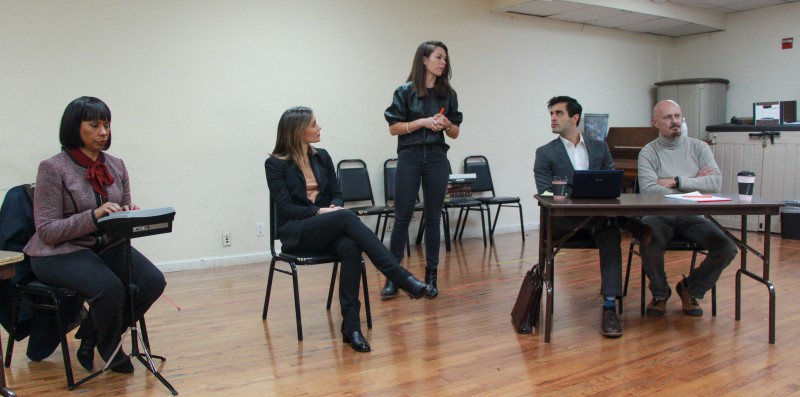You may recognize Christine Evangelista as The Arrangement’s Megan Morrison or The Walking Dead’s Sherry, Dwight’s ex-wife and a member of the Saviors. Evangelista’s latest role is a far cry from fleeing zombies, and yet it’s no less haunting. The actor stars in Dep Kirkland’s new play MsTRIAL, which began performances Off-Broadway at New World Stages December 4.
The actor plays Karen, an associate at a law firm and one-half of the powerhouse team with internationally renowned trial lawyer John Paris. After a major triumph in court, the office celebrates, but too much alcohol leads to the explicit crossing of boundaries between John and Karen that can’t be undone. An attorney-turned-playwright, Kirkland confronts the legal and ethical issues surrounding one of the most prominent issues plaguing our society today.

Evangelista values playing such a strong character, as well as the opportunity to show audiences that strength isn’t the same as protection in a broken system. “There is a line in the play when Karen says, ‘That’s the scary part…I thought I could [take care of myself],’” she says. “Karen is a strong, very professional, talented trial lawyer and it’s because of these skills that she’s able to succeed in a male-dominated field. But despite how successful she is on her own merit, even she becomes victim of this patriarchy.”
MsTRIAL isn’t the first time Evangelista has taken on a powerful and culturally significant role. In addition to her screen work, Evangelista honed her skills in theatre, including appearances in Breaking Legs and Danny and the Deep Blue Sea (both at Soho Playhouse) as well as Less Than Human Club at HB Studios Theater.
Here, she proves her theatre credentials:
What was your first professional job?
Christine Evangelista: I was a “featured extra” playing a hit and run victim on 3rd Watch on NBC. I was a minor at the time and needed to be accompanied by a parent. My mother took me to set and on our way home, (covered in fake blood), we were pulled over by police driving across the Verrazano Bridge. My mother was horrified by their accusation and after explaining the work I just did, they let us go. She never did take me to set again after that.
What was the stage show that has most influenced you?
I absolutely loved Alan Cumming in Cabaret and Marin Ireland’s performance in Ironbound.
Is there a stage moment you witnessed that stays with you?
The most powerful moment I witnessed happened when I left the theatre one night while in previews for MsTrial. It was late, I was exhausted, and as I was walking out of the backstage door, a young girl was waiting for me on the street to share her experience with sexual assault. She hugged me. It was a powerful moment with not many words. I thank the theatre for that human connection, for the ability to tell stories that can help people tap into their own human experience, for bringing people together.
What’s been the biggest challenge of your career?
Pilot season.
What’s been the most rewarding experience onstage for you?
I like the feeling of being in a “troupe.” Like any production, I’ve formed deep bonds with my castmates. I feel it’s particularly strong in theatre because you feel as though you’re in the trenches with them—working all day and night, experimenting and creating each and every moment on stage together. Additionally, I find applause to be very rewarding.
Who is a collaborator from theatre that made you better?
My teacher and mentor, Scott Freeman from The Freeman Studio. He has an encyclopedic knowledge of plays and a brilliant way to communicate direction.
Working in TV, how do you balance stage and screen? Do you want to?
I want to work and I want to always be working on my craft. It’s the goal for actors to have the opportunity to balance both. I’d be very fulfilled continuing to do that. It’s certainly the plan.
What is your favorite part of doing TV that’s different from theatre?
The money, craft services, and I can bring my dog.
John explicitly violates a boundary with Karen. How do you personally grapple with this story?
For me, there is no “moral question.” There is no “gray area.” “No” means No. It doesn’t matter if there’s a professional relationship or they were too drunk or there is an underlying attraction between two parties. All these other elements are external forces.
What do you feel is our obligation as artists and theatremakers to convey in stories about intimacy and consent?
This story is a very provocative, sensitive and triggering subject for the alarmingly vast majority of women. As an actress, I have a responsibility to bring to this character my own experience and then let my character’s experience affect the audience’s experience. I strongly believe that all forms of art have a powerful role to play in causes of social justice. My hope is that a play like this and my performance will impact the way some people think about the issue of consent and the failures of the justice system to protect victims of sexual assault.










